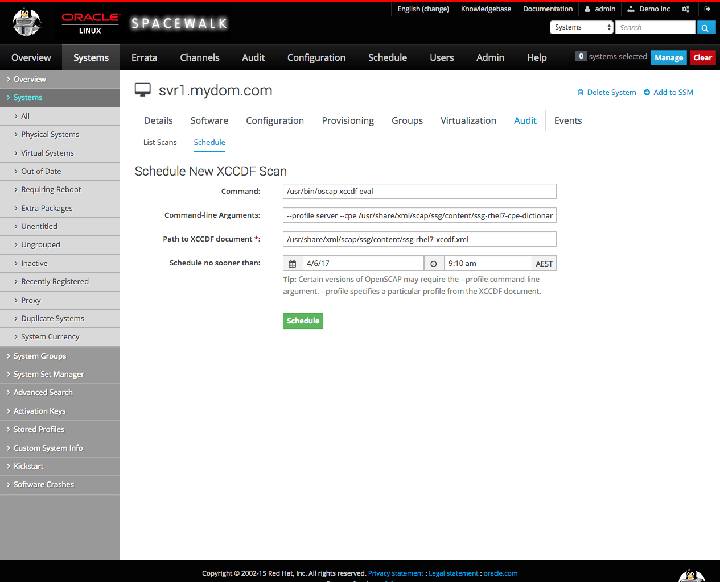The software described in this documentation is either no longer supported or is in extended support.
Oracle recommends that you upgrade to a current supported release.
Chapter 11 Performing OpenSCAP Auditing of Client Systems
The scap-security-guide package, which is
available for Oracle Linux 6 and Oracle Linux 7, provides SCAP
Security Guides in eXtensible Configuration Checklist Description
Format (XCCDF) that have been updated to include Common Platform
Enumeration (CPE) definitions for Oracle Linux.
You can use the SCAP Security Guide or any OpenSCAP compliant XCDDF or Open Vulnerability and Assessment Language (OVAL) files. Oracle provides OVAL files at https://linux.oracle.com/security/.
The client system must permit the Spacewalk Server to run remote commands. See Section 7.1, “Enabling Remote Configuration in a Kickstart Profile by Using the Spacewalk Web Interface” and Section 7.3, “Enabling Remote Configuration Manually”.
To be able to run OpenSCAP scans on a client system, install the
spacewalk-oscap package on that system.
For more information about using OpenSCAP compliance checking with Oracle Linux, see Running OpenSCAP Compliance Checks on Oracle Linux.
11.1 Performing OpenSCAP Auditing of Client Systems by Using the Spacewalk Web Interface
Typically, you would use the oscap command with Spacewalk to perform scans. See Oracle® Linux 6: Security Guide and Oracle® Linux 7: Security Guide for more information about using this command.
To schedule a scan for a system or system group:
-
For a system:
-
Go to Systems, click the system name, select the Audit tab, and then select the Schedule tab.
For a system group:
-
Go to Systems and select System Groups.
-
Click the system group name.
-
On the Details page, click Work With Group.
Spacewalk loads the group into the System Set Manager.
-
Select the Audit tab.
-
-
On the Schedule New XCCDF Scan page, enter the scan settings in the following fields:
- Command-line arguments
-
Enter any command-line arguments to the command that you are using to perform the scan. For example:
--profile server. - Path to XCCDF document
-
Enter the path of the XCCDF checklist file, for example
/usr/share/xml/scap/ssg/content/ssg-rhel6-xccdf.xml, or downloaded OVAL definition file, for examplecom.oracle.elsa-2014.xml.
-
Change the schedule if required, and click Schedule.
When the scan is complete, a summary of the results of the scan are displayed under the List Scans tab. Oracle recommends that you schedule regular scans to check for security regressions.
11.2 Performing OpenSCAP Auditing of Client Systems by Using the spacecmd Command
The spacecmd command supports XCCDF scans but not OVAL scans. Instead, you can use Spacewalk's remote command execution facility to run oscap oval eval on Spacewalk clients.
See Oracle® Linux 6: Security Guide and Oracle® Linux 7: Security Guide for more information about using the oscap command.
To schedule an XCCDF scan for systems, use the scap_schedulexccdfscan command as follows:
spacecmd {SSM:0}> scap_schedulexccdfscan '/usr/share/xml/scap/ssg/content/ssg-rhel6-xccdf.xml' \
'profile server' svr1.mydom.com
To list scheduled auditing scans, use the schedule_list command:
spacecmd {SSM:0}> schedule_list
ID Date C F P Action
-- ---- --- --- --- ------
522 20150625T12:56:01 0 0 1 OpenSCAP xccdf scanning
...
See Section 10.3, “Working With Scheduled Events”.
To list the summary results of completed XCCDF scans, use the scap_listxccdfscans command:
spacecmd {SSM:0}> scap_listxccdfscans svr1.mydom.com
To list the details and results of an XCCDF scan, specified by its scan ID, use the scap_getxccdfscandetails and scap_getxccdfscanruleresults commands, as shown in the following example:
spacecmd {SSM:0}> scap_getxccdfscandetails scan_ID
spacecmd {SSM:0}> scap_getxccdfscanruleresults scan_ID
